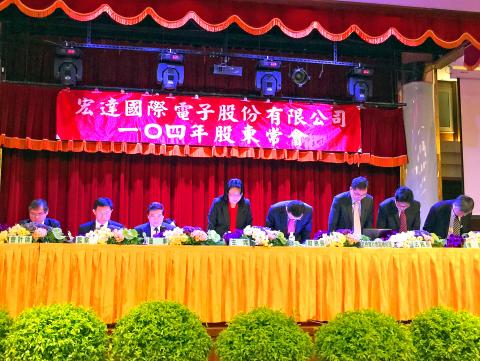HTC chairwoman and chief executive officer Cher Wang (王雪紅) yesterday apologized to shareholders for the company’s disappointing performance over the past few months.
Wang said HTC’s performance was mainly due to its poor operational efficiency and overly conservative marketing strategy amid fierce competition in the global market.
“HTC’s recent performance has let people down,” Wang said at the company’s annual general meeting.

Photo: CNA
Wang’s apology came a day after HTC’s stock price dropped below NT$100 to a 12-year low of NT$98. Shares stood as high as NT$1,300 on April 1, 2011.
This year’s HTC flagship One M9 smartphone, which was launched in April, was criticized for lacking differentiation from its previous model, the One M8. The smartphone also encountered thermal issues causing shipment delays after its sales launch.
In an effort to improve the company’s smartphone segment, HTC’s core business, Wang said the company plans to launch a “hero product” in October, and make significant improvements in innovation and design for the next flagship model next year.
The company is also planning to improve its product mix strategy for smartphones, she added.
Wang said HTC would reduce its production costs by improving production efficiency as well as optimizing its components supply chain, adding that it would also outsource some orders to increase operational flexibility.
Saying that the marketing budgets of Apple Inc and Samsung Electronics Co are 20 times higher than HTC’s, Wang said the firm must improve its marketing strategies.
Chief financial officer Chang Chia-lin (張嘉臨) said that HTC increased research and development investment by 4 percent annually to NT$13 billion (US$419.33 million) last year, while its marketing expenses dropped 19.26 percent to NT$26 billion from a year ago.
HTC does not sell well using conventional marketing strategies, Wang said, adding that it would not renew US actor Robert Downey Jr’s contract after this year, but that it would keep working with the popular Taiwanese rock group Mayday (五月天).
In an attempt to develop new business, HTC would develop virtual reality applications, such as the HTC Vive virtual reality headset that it developed with US-based game developer Valve, Wang said.
Wang said that the HTC Vive, which was unveiled at the annual World Mobile Congress in Barcelona in March, has been well-received by the market and that the company would focus on virtual reality development.
“I am upbeat about HTC’s outlook. We aim to focus on developing the right products,” Wang said.
The company has not announced a launch date for the Vive.
At an investors’ conference in February, Chang said that HTC hopes the non-smartphone segment can contribute at least 10 percent of the firm’s total revenues next year.
HTC’s shares closed up 0.51 percent at NT$98.5 in Taipei trading yesterday, while the TAIEX lost 0.12 percent.

STEEP DECLINE: Yesterday’s drop was the third-steepest in its history, the steepest being Monday’s drop in the wake of the tariff announcement on Wednesday last week Taiwanese stocks continued their heavy sell-off yesterday, as concerns over US tariffs and unwinding of leveraged bets weighed on the market. The benchmark TAIEX plunged 1,068.19 points, or 5.79 percent, to 17,391.76, notching the biggest drop among Asian peers as it hit a 15-month low. The decline came even after the government on late Tuesday authorized the NT$500 billion (US$15.2 billion) National Stabilization Fund (國安基金) to step in to buoy the market amid investors’ worries over tariffs imposed by US President Donald Trump. Yesterday’s decline was the third-steepest in its history, trailing only the declines of 2,065.87 points on Monday and

TAKING STOCK: A Taiwanese cookware firm in Vietnam urged customers to assess inventory or place orders early so shipments can reach the US while tariffs are paused Taiwanese businesses in Vietnam are exploring alternatives after the White House imposed a 46 percent import duty on Vietnamese goods, following US President Donald Trump’s announcement of “reciprocal” tariffs on the US’ trading partners. Lo Shih-liang (羅世良), chairman of Brico Industry Co (裕茂工業), a Taiwanese company that manufactures cast iron cookware and stove components in Vietnam, said that more than 40 percent of his business was tied to the US market, describing the constant US policy shifts as an emotional roller coaster. “I work during the day and stay up all night watching the news. I’ve been following US news until 3am

Six years ago, LVMH’s billionaire CEO Bernard Arnault and US President Donald Trump cut the blue ribbon on a factory in rural Texas that would make designer handbags for Louis Vuitton, one of the world’s best-known luxury brands. However, since the high-profile opening, the factory has faced a host of problems limiting production, 11 former Louis Vuitton employees said. The site has consistently ranked among the worst-performing for Louis Vuitton globally, “significantly” underperforming other facilities, said three former Louis Vuitton workers and a senior industry source, who cited internal rankings shared with staff. The plant’s problems — which have not

TARIFF CONCERNS: The chipmaker cited global uncertainty from US tariffs and a weakening economic outlook, but said its Singapore expansion remains on track Vanguard International Semiconductor Corp (世界先進), a foundry service provider specializing in producing power management and display driver chips, yesterday withdrew its full-year revenue projection of moderate growth for this year, as escalating US tariff tensions raised uncertainty and concern about a potential economic recession. The Hsinchu-based chipmaker in February said revenues this year would grow mildly from last year based on improving supply chain inventory levels and market demand. At the time, it also anticipated gradual quarter revenue growth. However, the US’ sweeping tariff policy has upended the industry’s supply chains and weakened economic prospects for the world economy, it said. “Now